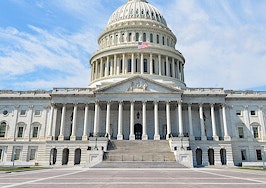Homeownership has helped Americans who might otherwise be unable to scrape together a nest egg do just that, Yale economics professor Robert Shiller noted in a New York Times editorial over the weekend.
But the Swiss do just fine amassing household savings and have a much lower homeownership rate, Shiller noted, arguing that it’s time to take away some of the “enormous subsidy to homeownership” provided by Uncle Sam — such as the mortgage interest deduction.
Not surprisingly, National Association of Realtors Chief Economist Lawrence Yun believes that Shiller has missed some “obvious facts.”
The housing crisis, Yun notes, “arose from easy lending,” and “did not happen because of the mortgage interest deduction.” Eliminating the mortgage interest deduction “will result in home price declines of about 15 percent,” Yun claims.
Shiller might be willing to concede some or all of those claims. His main point is less about the role housing subsidies played in creating the conditions that led to the downturn, and more to do with whether there are societal drawbacks to relying so heavily on homeownership as a mechanism for household savings.
There are, Shiller notes, advantages to being a renter in today’s economy. Renters, he says, “are more mobile. That means they are more likely to accept jobs in another city, or even on the other side of a large metropolis.”
Besides, Shiller says, “It’s hardly wise to put all of one’s life savings into a single, highly leveraged investment in a home — as millions of underwater borrowers today can attest.”
But Shiller concedes that “if and when” the government scales back subsidies for homeowners, “it will have to find some other way to promote proper saving.”
Although NAR is a staunch defender of the mortgage interest deduction and Yun’s stance is to be expected, Yun has a history of taking Shiller to task.
In 2007, when many observers were still speculating about the possibility of a “soft landing” for housing markets, Yun chastised Shiller for his assessment that mortgage troubles were only beginning, and that home prices in some markets could fall 50 percent in coming years.
Predicting that home prices and sales would rise in 2008, Yun told Realtor Magazine that “Dire predictions like (Shiller’s) do more than grab the attention of the media; they can shake consumer confidence and help make such predictions self-fulfilling as homebuyers stay on the sidelines, pressuring sellers to lower prices — in effect fueling a downward spiral.”
Shiller’s prediction turned out to the the more accurate one. But in 2008, as home prices continued to fall, Yun questioned whether Shiller had an ulterior motive in helping create the Standard & Poor’s/Case-Shiller home price indices.
As a co-founder of MacroMarkets LLC, Yun said, Shiller was profiting from the trade of housing and futures options on the Chicago Mercantile Exchange and had a financial incentive to “scare” the market.
“The more hedging of bets that occur, the more profits go into Dr. Shiller’s bank account,” Yun wrote in a February 2008 editorial that was published by the Wall Street Journal and appeared on NAR’s website. “And more hedging of the bets will take place if people believe there will be a crash in housing values.”
While plenty of people didn’t see the housing crash coming, by 2008 it should have been apparent that there wasn’t much point in shooting the messenger. While consumer sentiment and “animal spirits” undoubtedly played a role in magnifying the crash, no amount of optimism could have protected the fragile bubble created by loose lending standards.
Yun’s refusal to debate Shiller’s larger point about housing subsidies today doesn’t bode well for NAR’s chances of heading off changes to the mortgage interest deduction and other homeowner perks.
As lawmakers eye the MID and other deductions as potential sources of revenue, arguing that changes to the mortgage interest deduction will hurt home prices simply isn’t enough.
The real estate industry must put forward more convincing arguments that subsidies for homeownership really do benefit homeowners, and society.



